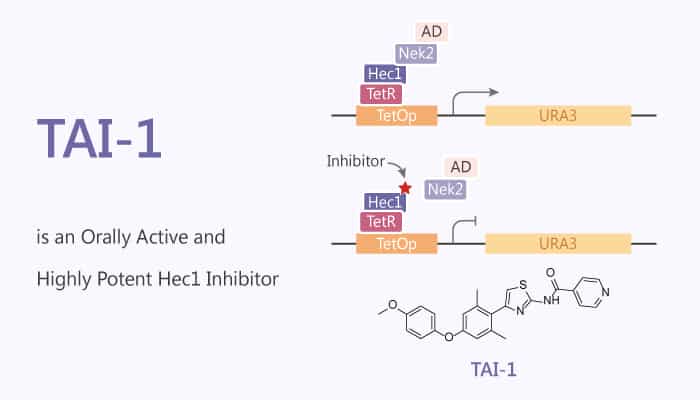Hec1 (Ndc80) is one of the outer kinetochore proteins and forms heterotetramers with proteins NUF2, SPC25, and SPC24. Specifically, drugs that interfere with mitosis are part of the most successful chemotherapeutic compounds for cancer in clinical practice. Hec1, a component of mitochondria, is overexpressed in a variety of human cancers, making it to be an attractive molecular target. Besides, Hec1 interacts directly with various kinetocytes including NUF2, SPC25, and Zwint-1, and with mitotic kinases Nek2 and Aurora B. Moreover, cells with rapid division expressed high levels of Hec1, while those in terminally differentiated cells were too low to be detected. Furthermore, RNAi or small molecules targeted inhibition of Hec1 can effectively prevent tumor growth in animal models. Therefore, Hec1 has become an ideal target for the clinical treatment of cancer. TAI-1 is an orally active and highly potent first-in-class Hec1 inhibitor with anticancer activity.

TAI-1 is an orally active and highly potent first-in-class Hec1 inhibitor with anticancer activity.
But, how does TAI-1 protect against cancer cells via Hec1? Let’s discuss it in detail. First of all, TAI-1, an orally active anticancer agent, is a highly potent first-in-class Hec1 inhibitor, with a GI50 of 13.48 nM in K562 cells. Meanwhile, TAI-1 disrupts Hec1-Nek2 protein interaction, leads to Nek2 degradation. TAI-1 induces significant chromosomal misalignment in metaphase and induces apoptotic cell death.
In the second place, TAI-1 induces cancer cell death through the induction of cleavage of apoptotic proteins Caspase 3 and PARP and degradation of anti-apoptotic proteins MCL-1. Nonetheless, it suggests that TAI-1 leads to the activation of the apoptotic pathways. Particularly, TAI-1 is effective in many cancer cells, such as chronic myeloid leukemia, Breast, metastatic-pleural, invasive ductal carcinoma, Acute myeloid leukemia, with GI50 less than 100 nM.
Last but not the least, TAI-1 inhibits tumor growth in multiple cancer xenograft models by 20 mg/kg intravenously IV/ or 150 mg/kg per oral PO/BID. Interestingly, TAI-1 does not lead to any loss in body weight.
All in all, TAI-1 is an orally active and highly potent first-in-class Hec1 inhibitor with anticancer activity.
References:
Lynn Y L Huang, et al. J Exp Clin Cancer Res. 2014 Jan 9;33(1):6.